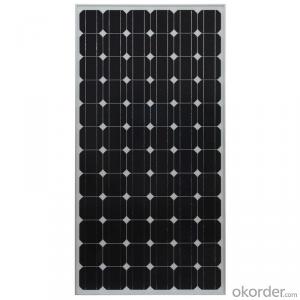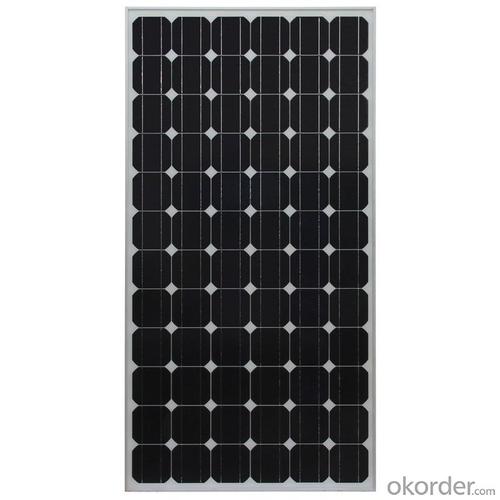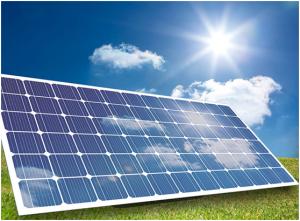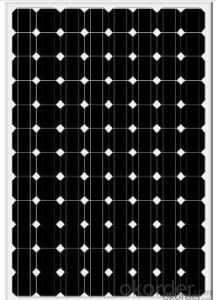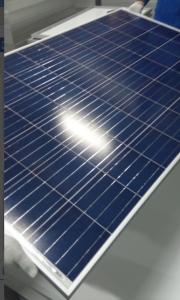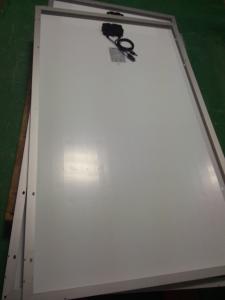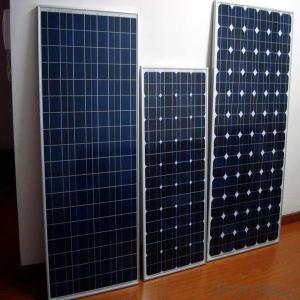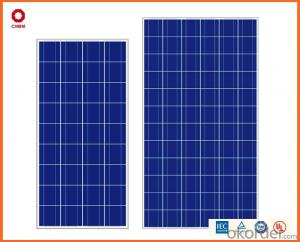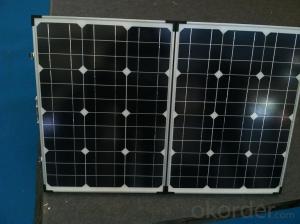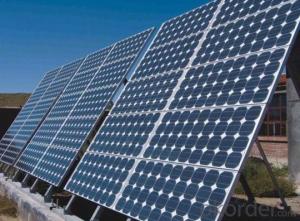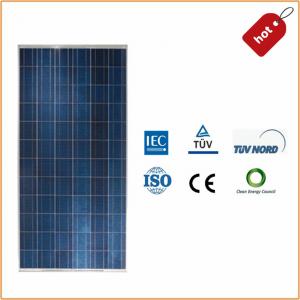Grade A Solar Panels for A Mobile Home with TUV and UL Certificate
- Loading Port:
- Tianjin
- Payment Terms:
- TT OR LC
- Min Order Qty:
- 1000 watt
- Supply Capability:
- 10000000 watt/month
OKorder Service Pledge
OKorder Financial Service
You Might Also Like
Specification
Product Description
Power: 250W
Open-circuit voltage (Voc): 44.75V
Short-circuit current (Isc): 8.45A
Optimum operating voltage (Vmp): 35.28V
Optimum operating current (Imp): 7.94A
Material: aluminum alloy
Type: anodized
Type of junction box: PV
Thickness: 45mm
Dimensions: 1956 x 992 x 50mm
Certification: CE
Compliant with RoHS Directive
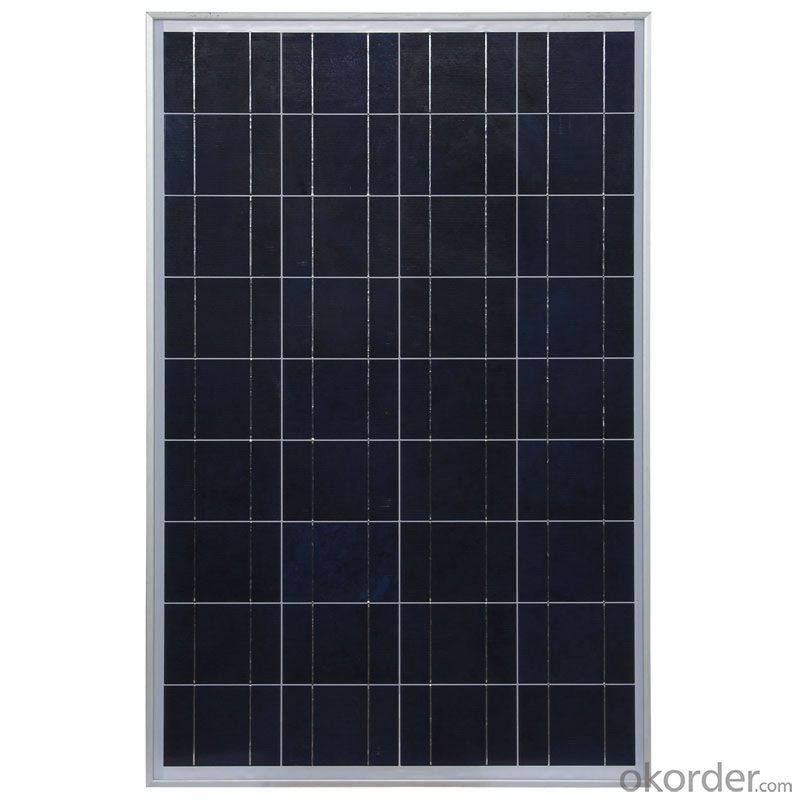
Product Details
Product Certifications:
Certificate Standard:TUV View scanned certification
Certificate Number:PV 50213194Check in TUV database
Issue Date:21-Sep-2011
Issued By:TUV Rheinland LGA Products Gmbh
Expiry Date:20-Sep-2016
| ELECTRICAL CHARACTERISTICS | ||||||||||
| Maximum Power as per STC | Pmax(W) | 230 | 235 | 240 | 245 | 250 | ||||
| Power Tolerance | % | ± 3% | ||||||||
| Maximum Power Voltage | Vm(V) | 30.48 | 30.6 | 30.66 | 30.35 | 30.46 | ||||
| Maximum Power Current | Im(A) | 7.6 | 7.68 | 7.83 | 8.08 | 8.21 | ||||
| Open Circuit Voltage | Voc(V) | 36.6 | 36.72 | 36.84 | 36.36 | 36.5 | ||||
| Short Circuit Current | Isc(A) | 8.17 | 8.23 | 8.32 | 8.79 | 8.93 | ||||
| Maximum System Voltage | VDC | 1000 | ||||||||
| Cell Efficiency | % | 15.8 | 16.1 | 16.4 | 16.8 | 17.1 | ||||
| Module Efficiency | % | 14.1 | 14.4 | 14.7 | 15.0 | 15.3 | ||||
| Cells per Module | Pcs | 60 | ||||||||
| Cell Type | Polycrystalline silicon | |||||||||
| Cell Size | mm | 156 x 156 | ||||||||
| Bypass Diodes | Pcs | 12Amp, 6 pcs | ||||||||
| Max. Series Fuse Rating | A | 15A | ||||||||
| Temperature coefficient of Isc | % / | 0.05 | ||||||||
| Temperature coefficient of Voc | % / | -0.35 | ||||||||
| Temperature coefficient of power | % / | -0.47 | ||||||||
| NOCT- Nominal operating cell temperature | 47 ± 2 degree | |||||||||
| Operating Temperature | -40 to +85 degree | |||||||||
| MECHANICAL CHARACTERISTICS | ||||||||||
| Dimensions | mm | 1650 x 990 x 50 | ||||||||
| Weight | Kg | 19.8 | ||||||||
| Type of Junction Box | TUV certified, IP65 | |||||||||
| Cable Type, Diameter | TUV certified, 4mm 2, 90 cm in length | |||||||||
| Connector | compatible to Type 4 (MC4) | |||||||||
| Tempered Glass | 3.2 mm, high transmission, low iron | |||||||||
- Q: How do solar panels affect the overall energy security of a building?
- Solar panels can greatly enhance the overall energy security of a building. By harnessing the sun's energy, solar panels provide a reliable and sustainable source of electricity. This reduces a building's dependence on traditional energy sources, such as fossil fuels, which are finite and subject to price volatility or supply disruptions. Solar panels also contribute to grid resilience, as they can continue generating power even during power outages. Consequently, incorporating solar panels into a building's energy mix can enhance its energy security by diversifying its energy sources and promoting self-sufficiency.
- Q: I have a shed that has wiring run for light bulb and a couple outlets. It is in a dark corner of my yard and at night is kinda creepy to go in with even a flashlight. I am weighing the option/expense of running electricity from the house on an overhead line versus putting up a 45 watt solar panel on the metal roof with inverter, battery etc. Sunlight is good to excellent at the location. Question is - will this be sufficient for the occasional use of light and an outlet? What can I expect? Pros and cons appreciated
- For okorder /... Electric power. Rather than an overhead cable you can bury a cable or PVC conduit and power the shed with 20AC. You can easily supply 5 to 30A of 20V AC that supply all of your power needs without the issues and limitations of the Solar system. If your shed is within 200 ft of your home you should be able to power the shed for less than $400 if you do the work.
- Q: Can solar panels be installed on a boat or yacht?
- Yes, solar panels can be installed on a boat or yacht. In fact, many boat owners choose to install solar panels to harness the power of the sun and generate electricity while out on the water. These panels are typically mounted on the deck or on top of a bimini, and they are used to charge batteries and power various onboard systems, reducing the reliance on traditional fuel sources.
- Q: I need a solar panel for my laptop as i am going camping in the desert, and i need my laptop. There are two choices of solar panels, One is 0 watts and 2 V and maximum power current 0.56 amps. The other one is 2 watts, 2 V and no mention of current. My laptop plug says input 00-240V and .5A and then output 5V-5A. Which one should i get for my laptop. If there are other choices please tell me ill look them up on OKorder.Thanks
- I'm afraid neither of these panels will do much for charging or running your laptop. If the power brick is supposed to emit 5 volts at 5 amps, that's 75 watts. Neither of those panels provides enough voltage and the power output is obviously far too small. The capabilities of solar power are vastly overestimated for small panels. Sunlight is limited to about kilowatt per square meter under ideal conditions (summer time, clear blue sky, for a few hours around noon in the US southwest). But consumer panels top out at about 5% efficiency, so your limit is 50 watts per square meter - in other words you would need about half a square meter, or about six square feet, of panel to provide 75 watts. And even under ideal conditions you will only get that much for a few hours each day. Also, the panel's voltage output is not regulated, so even if you find a panel that emits 5 volts (this would actually have to be made up of groups of 30 cells in series, as they emit half a volt each at most) you can't just connect the panel output into your laptop's DC in. You'd need a regulated DC-to-DC supply, and since that is not 00% efficient it will cost a bit of the power... now you need even more panel area. All in all, not really a practical thing to carry along on a camping trip.
- Q: How much space do solar panels require?
- The amount of space required for solar panels can vary depending on factors such as the type and size of the panels, their efficiency, and the energy needs of the system. On average, an average-sized residential solar panel system typically requires around 100-400 square feet of roof space. However, ground-mounted systems can require larger areas, and more efficient panels can generate the same amount of electricity in a smaller space.
- Q: Can solar panels be installed on water bodies or reservoirs?
- Yes, solar panels can be installed on water bodies or reservoirs. This is known as floating solar or floating photovoltaic (FPV) technology. It involves mounting solar panels on buoyant platforms on the surface of the water. This approach offers several benefits, including reduced land requirements, increased energy generation due to the cooling effect of water, and reduced evaporation from the water body.
- Q: what is solar panel? full description needed?
- Solar panel refers to a panel designed to absorb the sun's rays as a source of energy for generating electricity or heating.
- Q: Can solar panels be used in areas with high levels of windstorms?
- Yes, solar panels can be used in areas with high levels of windstorms. However, it is important to ensure that the solar panels are properly installed and secured to withstand the strong winds. Additional measures such as reinforced mounting structures and regular maintenance can also be taken to enhance their durability in such conditions.
- Q: How can solar panels be used for heating water?
- Solar panels can be used for heating water by capturing sunlight and converting it into electricity. This electricity can then be used to power heating elements or heat pumps that warm up water for various purposes, such as domestic use or swimming pools.
- Q: Can solar panels be used for charging electric vehicles?
- Yes, solar panels can be used to charge electric vehicles.
Send your message to us
Grade A Solar Panels for A Mobile Home with TUV and UL Certificate
- Loading Port:
- Tianjin
- Payment Terms:
- TT OR LC
- Min Order Qty:
- 1000 watt
- Supply Capability:
- 10000000 watt/month
OKorder Service Pledge
OKorder Financial Service
Similar products
Hot products
Hot Searches
Related keywords
